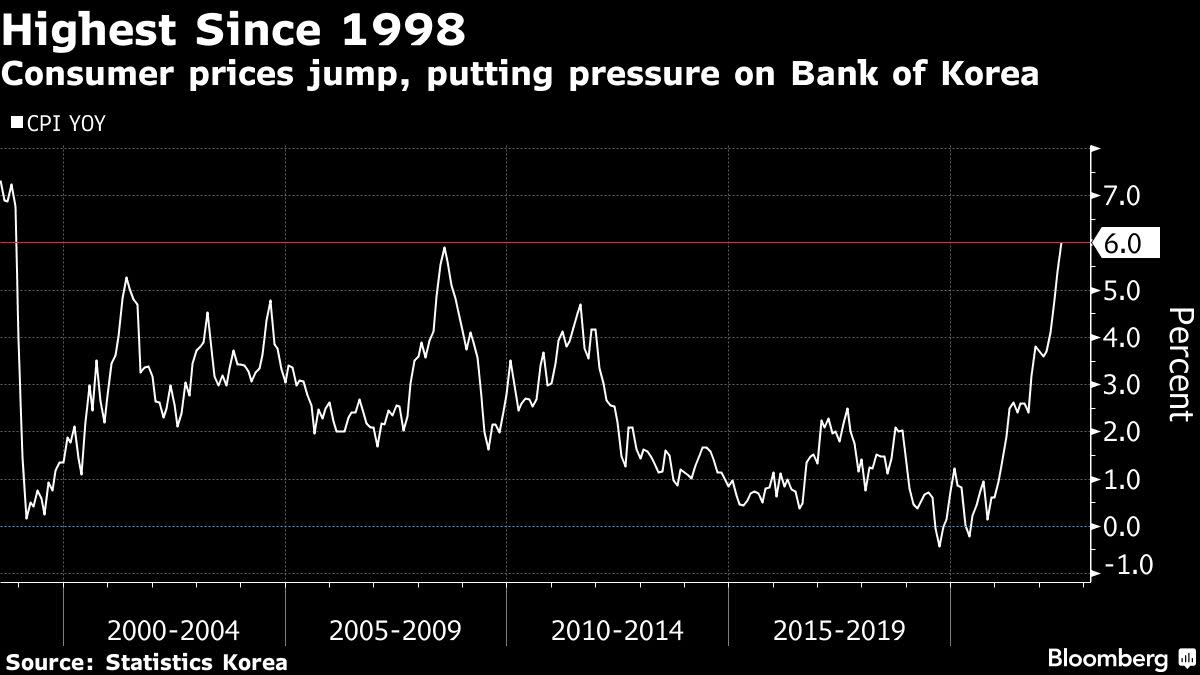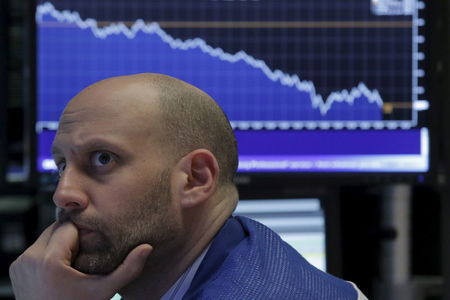Uncategorized
Fed Braces as Another Big US Inflation Number Looms: Eco Week

(Bloomberg) — US inflation data in the coming week may stiffen the resolve of Federal Reserve policy makers to proceed with another big boost in interest rates later this month.
Most Read from Bloomberg
The closely watched consumer price index probably rose nearly 9% in June from a year earlier, a fresh four-decade high, based on the median projection of economists in a Bloomberg survey. Compared with May, the CPI is seen rising 1.1%, marking the third month in four with an increase of at least 1%.
While persistently high and broad-based inflation is seen persuading Fed officials to raise their benchmark rate 75 basis points for a second consecutive meeting on July 27, recession concerns are mounting. There are signs, though, that price pressures at the producer level are stabilizing as commodities costs — including energy — retreat.
Even so, the inflation data are likely to draw heightened scrutiny globally after a faster-than-consensus result for May caused ructions in financial markets.
The US inflation data follow figures Friday showing stronger-than-expected job growth and an unemployment rate near a five-decade low, underscoring a tight labor market that’s helping to keep wage growth elevated.
Figures on producer prices, industrial production and consumer sentiment, as well as the Fed’s Beige Book, are also released in the coming week. Regional Fed presidents Thomas Barkin and Raphael Bostic will discuss the economy and monetary policy at separate engagements.
What Bloomberg Economics Says:
“After employment data showed the labor market remains rock-solid, surging gasoline prices will push June’s headline CPI to a fresh high. Even with growth slowing, the underlying shift toward services will prevent the economy from falling into a technical recession in the second quarter.”
–Yelena Shulyatyeva and Andrew Husby. For full analysis, click here
Further north, in a precursor to the sort of decision the Fed is facing, the Bank of Canada will accelerate hiking with a rate increase of 75 basis points, if investor bets are to be believed.
Elsewhere, the shaky economic economic backdrop is likely to focus the finance ministers and central bankers from the Group of 20 meeting in the Indonesian resort of Bali starting on Friday. Senior officials are set to discuss the latest on inflation, global risks, the war in Ukraine, and debt.
Meanwhile, global monetary tightening is likely to continue in earnest: aside from Canada, policy makers in Chile, New Zealand and South Korea may all deliver rate hikes of at least 50 basis points.
Click here for what happened last week and below is our wrap of what’s coming up in the global economy.
Asia
The Reserve Bank of New Zealand and the Bank of Korea meet Wednesday, with further major rate hikes expected in an attempt to tame inflation. Investors will watch how those forerunners of global monetary tightening communicate further action going ahead.
South Korea’s jobless data will come out the same day, while Australia’s employment report will be released Thursday, giving insight into the state of the economy in the second quarter.
Earlier in the week, US Treasury Secretary Janet Yellen is expected to meet with Japanese Finance Minister Shunichi Suzuki ahead of the G-20 meetings in Indonesia.
China is set for a bumper week of economic data that may shape the outlook for monetary and fiscal policy for the rest of the year.
Trade data on Wednesday will give more clues about softening global demand, ahead of Friday’s GDP figures, which are under more scrutiny as Covid outbreaks persist.
Fiscal data during the week will show the state of local government finances, while credit figures will be watched for signs of improving business and household sentiment.
Europe, Middle East, Africa
European Central Bank policy makers have until Wednesday to air views in public about their July 21 meeting before a pre-decision blackout kicks in. They’re preparing to start raising rates, and to unveil an accompanying crisis tool to mitigate the fallout on weaker euro members such as Italy.
ECB President Christine Lagarde will attend a meeting of euro-area finance ministers at the start of the week, though few other appearances are scheduled.
Likely to focus their minds is a temporary closure of the Nord Stream gas pipeline from Russia to take effect on Monday. German officials fear the shutdown for 10 days of routine maintenance may become permanent.
Among data due, euro-zone industrial production on Wednesday will probably signal slowing expansion as the second quarter progressed, while the state of the region’s worsening trade deficit — perhaps reflected in the euro’s drop to a two-decade low — will be revealed on Friday.
In the UK, economists expect gross domestic product to have barely increased in May after a decline the previous month, in figures due on Wednesday.
That picture of anemic growth amid rampant inflation is confronting Bank of England Governor Andrew Bailey, who’ll deliver a speech on Tuesday. A sickly economy will also greet the successor to Prime Minister Boris Johnson as the process of replacing him begins in earnest.
Elsewhere around Europe, consumer-price data for June will underscore the cost-of-living shock reverberating around the continent, albeit unevenly.
The Czech Republic’s inflation rate is already among the region’s highest, and it’s set to rise further, to above 17%. Lower but still hefty will be equivalent numbers in Scandinavia. Sweden’s price growth is likely to reach 8.3%, according to economists.
Further south, data from Ghana on Wednesday will likely show inflation at almost triple the 10% ceiling of the central bank’s target, a possible impetus to raise rates for a third time this year.
Nigerian data on Friday are expected to show inflation accelerated for a fifth month. A significant quickening might persuade policy makers to raise borrowing costs the following week.
Also on Friday, Israeli data may show inflation remaining stubbornly above the government’s 1% to 3% target.
Latin America
In a light week for Brazil, weekly trade figures should feature more torrid export readings while May retail sales figures may build on better-than-expected April results.
With its economy likely slowing into a second-half recession as rising interest rates and double-digit inflation bite, Chile’s central bank is in a tight place. Most analysts look for an ninth straight hike, pushing the key rate to 9.5%.
In Mexico, a pick-up in headwinds — stubborn inflation, rising interest rates and less buoyant sentiment — argue for some slowing in the manufacturing and retail figures for May and June.
Argentine inflation data due look to head higher from May’s 60.7%, which prompted the central bank to boost its key rate to 52%.
Peru posts June unemployment for the capital, Lima, and May economic activity, which declined for a third month in April. The economy is below its pre-pandemic level.
In Colombia, May data on manufacturing, industrial output and retail sales should underscore why analysts have been marking up their 2022 GDP forecasts. Amid a host of challenges, its economy is seen leading growth among the region’s big economies this year.
Most Read from Bloomberg Businessweek
©2022 Bloomberg L.P.
Uncategorized
BofA Securities maintains Amazon.com at ‘buy’ with a price target of $154.00
Uncategorized
Six people in critical condition, one still missing after Paris blast – prosecutor

5/5
© Reuters. French firefighters and rescue forces work after several buildings on fire following a gas explosion in the fifth arrondissement of Paris, France, June 21, 2023. REUTERS/Gonzalo Fuentes
2/5
PARIS (Reuters) – Six people remained in a critical condition and one person was believed still missing on Thursday, one day after a blast ripped through a street near Paris’ historic Latin Quarter, the city’s public prosecution office said. “These figures may still change,” prosecutor Maylis De Roeck told Reuters in a text message, adding that around 50 people had been injured in the blast, which set buildings ablaze and caused the front of one to collapse onto the street. Of two people initially believed missing, one has been found in hospital and is being taken care of, the prosecutor said, adding: “Searches are ongoing to find the second person.” Authorities have not yet said what caused the explosion, which witnesses said had followed a strong smell of gas at the site. The explosion led to scenes of chaos and destruction in the historic Rue Saint Jacques, which runs from the Notre-Dame de Paris Cathedral to the Sorbonne University, just as people were heading home from work. It also destroyed the facade of a building housing the Paris American Academy design school popular with foreign students. Florence Berthout, mayor of the Paris district where the blast occurred, said 12 students who should have been in the academy’s classrooms at the time had fortunately gone to visit an exhibition with their teacher.
“Otherwise the (death toll) could have been absolutely horrific,” Berthout told BFM TV. She said three children who had been passing by at the time were among the injured, although their lives were not in danger.
Uncategorized
4 big analyst cuts: Alcoa & DigitalOcean shares drop on downgrades

© Reuters.
Here is your Pro Recap of the biggest analyst cuts you may have missed since yesterday: downgrades at Alcoa, DigitalOcean, Teleflex, and Xcel Energy.InvestingPro subscribers got this news in rapid fire. Never be left in the dust again.Alcoa stock drops on Morgan Stanley downgrade Alcoa (NYSE:) shares fell more than 3% pre-market today after Morgan Stanley downgraded the company to Underweight from Equalweight and cut its price target to $33.00 from $43.00, as reported in real time on InvestingPro.The firm sees a significant decline in consensus estimates, and as negative earnings revisions materialize, it believes the stock will face downward pressure and underperform.The analyst’s estimates for EBITDA in Q2, 2023, and 2024 are substantially lower than the consensus. The stock is currently trading above its historical average. The firm said its downward revisions in earnings estimates and price target are attributed to the company’s high operating leverage to aluminum prices.DigitalOcean stock plunges on downgradePiper Sandler downgraded DigitalOcean (NYSE:) to Underweight from Neutral with a price target of $35.00. As a result, shares plunged more than 5% pre-market today.The company reported its last month, with revenue beating the consensus estimate, while EPS coming in worse than expected. Furthermore, the company provided a strong outlook, which was above the Street estimates.2 more downgradesTeleflex (NYSE:) shares fell more than 3% yesterday after Needham downgraded the company to Hold from Buy, noting that UroLift expectations may still be too high.According to Needham, their checks indicate that urologists are reducing their use of UroLift due to its retreatment rates, reimbursement cuts, and increasing use of competing procedures. This is also supported by their Google Trends data analysis, which indicates decreasing search interest in UroLift.BMO Capital downgraded Xcel Energy (NASDAQ:) to Market Perform from Outperform and cut its price target to $64.00 from $69.00 to reflect the lower-than-expected terms of the company’s regulatory settlement in Colorado.Amid whipsaw markets and a slew of critical headlines, seize on the right timing to protect your profits: Always be the first to know with InvestingPro.Start your free 7-day trial now.

 Forex3 years ago
Forex3 years agoForex Today: the dollar is gaining strength amid gloomy sentiment at the start of the Fed’s week

 Forex3 years ago
Forex3 years agoUnbiased review of Pocket Option broker

 Forex3 years ago
Forex3 years agoDollar to pound sterling exchange rate today: Pound plummeted to its lowest since 1985

 Forex3 years ago
Forex3 years agoHow is the Australian dollar doing today?

 Cryptocurrency3 years ago
Cryptocurrency3 years agoWhat happened in the crypto market – current events today

 World3 years ago
World3 years agoWhy are modern video games an art form?

 Commodities3 years ago
Commodities3 years agoCopper continues to fall in price on expectations of lower demand in China

 Economy3 years ago
Economy3 years agoCrude oil tankers double in price due to EU anti-Russian sanctions






















